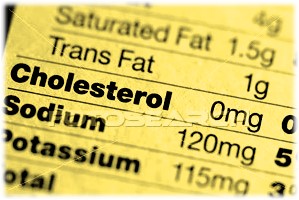The Basics of Cholesterol
Cholesterol
is a waxy, fat-like substance made in the liver and found in certain
foods, such as food from animals, like dairy products, eggs, and meat.
The body needs some cholesterol in order to function properly. 
Its cell
walls, or membranes, need cholesterol in order to produce hormones,
vitamin D, and the bile acids that help to digest fat. But, the body
needs only a small amount of cholesterol to meet its needs. When too
much is present health problems such as heart disease may develop.
Cholesterol and Heart Disease
When
too much cholesterol is present, plaque (a thick, hard deposit) may
form in the body's arteries narrowing the space for blood to flow to
the heart. Over time, this buildup causes atherosclerosis (hardening of
the arteries) which can lead to heart disease.
Types of Cholesterol
Cholesterol
travels through the blood attached to a protein -- this
cholesterol-protein package is called a lipoprotein. Lipoproteins are
classified as high density, low density, depending on how much protein
there is in relation to fat.
- Low density lipoproteins (LDL): LDL,
also called "bad" cholesterol, can cause buildup of plaque on the walls
of arteries. The more LDL there is in the blood, the greater the risk
of heart disease.
- High density lipoproteins (HDL):
HDL, also called "good" cholesterol, helps the body get rid of bad
cholesterol in the blood. The higher the level of HDL cholesterol, the
better. If your levels of HDL are low, your risk of heart disease
increases.
- Triglycerides: Triglycerides are
another type of fat that is carried in the blood by very low density
lipoproteins. Excess calories, alcohol, or sugar in the body are
converted into triglycerides and stored in fat cells throughout the body.
Risk Factors
|
Treatment for High Cholesterol
- Die
 t t
- Exercise
- Medication (prescribed by your physician)
|
Know Your Numbers:
- Total Cholesterol: < 200
- HDL > 60
- LDL < 70
- Triglycerides < 150
|
PSA – (Prostate-specific antigen)
Prostate-specific antigen (PSA) is a substance produced by the prostate gland. Elevated PSA levels may indicate prostate cancer or a noncancerous condition such as prostatitis (inflammation of the prostate) or an enlarged prostate.
This is a part of your normal blood test done during your physical
exam. The test involves drawing blood, usually from the arm. The
results are sent to a laboratory. Results come back to your physician
within a few days.
When Should I Have My PSA Levels Tested?
PSA blood tests and digital rectal exams
should be done every year for men beginning at age 50. It is
recommended that PSA blood test be done for African American men
beginning at age 40 and for all men if there is a history of prostate
cancer in the family.
If
your doctor is concerned that you might have prostate cancer based on
either your PSA level or a digital rectal exam, a biopsy (a lab testing of a small amount of tissue from the prostate) will be the next step This is the only way to positively identify the presence of cancer.
Know your PSA Level
- PSA level < 4 (suggests only 15 % chance of having prostate cancer)
- PSA level of 4-10 (suggests 25 % chance of having prostate cancer)
- PSA level > 10 (suggest 67% chance of having prostate cancer)
GOUT
What is gout?
Gout is a kind of arthritis. It can cause an attack of sudden burning pain, stiffness, and swelling in a joint, usually a big toe.
These attacks can happen over and over unless gout is treated. Over
time, they can harm your joints, tendons, and other tissues. Gout is
most common in men.
What causes gout?
Gout is caused by too much uric acid
in the blood. Uric acid is a waste product that results from normal
body processes and is also found in some foods. Most of the time,
having too much uric acid is not harmful. Many people with high levels
in their blood never get gout. When uric acid levels in the blood are
too high, the uric acid may form hard crystals in your joints. Your
chances of getting gout are higher if you are overweight, drink too
much alcohol, or eat too much meat and fish that are high in chemicals
called purines. Some medicines, such as water pills (diuretics), can
also bring on gout. Normally, the kidneys eliminate uric acid from the
body in urine. A buildup of uric acid in the body may cause kidney
stones, kidney damage, or a form of arthritis called gout. This may
occur when the body produces too much uric acid or when the kidneys
cannot eliminate uric acid adequately. Medication and diet changes can
reduce the amount of uric acid in the body.
>>>More>>>